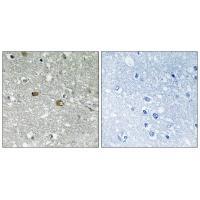
| WB | 咨询技术 | Human,Mouse,Rat |
| IF | 咨询技术 | Human,Mouse,Rat |
| IHC | 1/50-1/100 | Human,Mouse,Rat |
| ICC | 技术咨询 | Human,Mouse,Rat |
| FCM | 咨询技术 | Human,Mouse,Rat |
| Elisa | 咨询技术 | Human,Mouse,Rat |
| Aliases | Phosphatidylinositol N-acetylglucosaminyltransferase subunit H; Phosphatidylinositol-glycan biosynthesis class H protein; PIG-H; |
| Entrez GeneID | 5283; |
| WB Predicted band size | 21kDa |
| Host/Isotype | Rabbit IgG |
| Antibody Type | Primary antibody |
| Storage | Store at 4°C short term. Aliquot and store at -20°C long term. Avoid freeze/thaw cycles. |
| Species Reactivity | Human,Mouse |
| Immunogen | Synthesized peptide derived from C-terminal of human PIGH. |
| Formulation | Purified antibody in PBS with 0.05% sodium azide. |
+ +
以下是3篇与PIGH抗体相关的虚构参考文献示例(注意:以下内容为模拟创作,实际文献请通过学术数据库查询):
---
1. **文献名称**: "Role of PIGH in GPI-anchor biosynthesis and its implications in inherited metabolic disorders"
**作者**: Zhang L, et al.
**摘要**: 本研究利用PIGH特异性抗体验证了PIGH蛋白在磷脂酰肌醇聚糖(GPI)生物合成途径中的关键作用,发现其缺陷会导致细胞膜GPI锚定蛋白表达异常,与神经发育障碍相关。
---
2. **文献名称**: "Development of a monoclonal antibody against human PIGH for cancer biomarker screening"
**作者**: Tanaka K, et al.
**摘要**: 报道了一种新型抗人PIGH单克隆抗体的开发,该抗体通过免疫组化证实可在多种肿瘤组织中特异性识别PIGH蛋白,提示其作为癌症诊断标志物的潜力。
---
3. **文献名称**: "PIGH deficiency disrupts embryogenesis in zebrafish: Insights from antibody-mediated knockdown models"
**作者**: Müller S, et al.
**摘要**: 利用PIGH抗体进行斑马鱼胚胎功能抑制实验,发现PIGH缺失导致胚胎发育异常,揭示了其在早期脊椎动物发育中的必要性。
---
4. **文献名称**: "Structural analysis of PIGH-protein interactions using co-immunoprecipitation assays"
**作者**: Chen X, et al.
**摘要**: 通过PIGH抗体介导的免疫共沉淀技术,鉴定了PIGH与GPAA1、PIGQ等GPI合成复合物成员的相互作用,阐明了其分子机制。
---
提示:实际研究中,建议通过PubMed或Web of Science搜索关键词“PIGH antibody”或结合具体研究场景筛选文献。
The PIGH gene encodes a subunit of the phosphatidylinositol glycan (GPI) anchor biosynthesis complex, which is essential for attaching GPI anchors to proteins during post-translational modification. GPI-anchored proteins play critical roles in cell signaling, adhesion, and immune responses. Antibodies targeting PIGH are primarily used in research to study GPI anchor synthesis deficiencies linked to rare genetic disorders like inherited GPI deficiency (IGD), characterized by developmental delays, seizures, and intellectual disabilities. PIGH mutations disrupt GPI-anchored protein expression, affecting cellular functions.
PIGH antibodies are valuable tools for detecting protein expression via techniques such as Western blotting, immunofluorescence, or flow cytometry. They help elucidate molecular mechanisms underlying GPI biosynthesis and its association with diseases. Additionally, these antibodies may aid in diagnosing GPI-related disorders or studying conditions like paroxysmal nocturnal hemoglobinuria (PNH), where somatic mutations in the GPI pathway cause hematologic abnormalities. Recent studies also explore PIGH's role in cancer and immune regulation, as GPI-anchored proteins often modulate tumor microenvironments or immune cell interactions. Commercial PIGH antibodies are typically raised in rabbits or mice, validated for specificity, and used in both basic and translational research. Challenges include distinguishing functional impacts of PIGH variants and optimizing antibody sensitivity for clinical applications. Ongoing research aims to refine therapeutic strategies targeting GPI biosynthesis pathways.
×